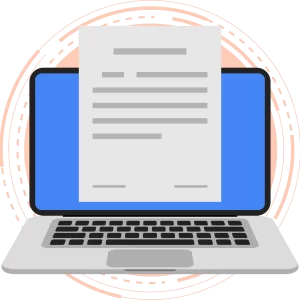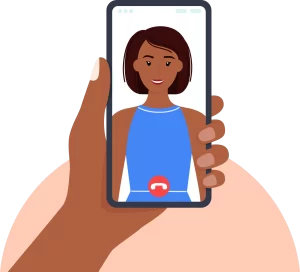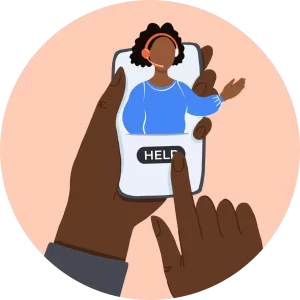Summary:
Why are our top 5 phone interview tips crucial?
A phone interview is one of the most common interview formats employers use, but it can be a nerve-wracking experience to prepare for.
Phone interviews are a vital part of any job search.
First impressions are critical in interviews, and a good phone interview can go a long way in helping you land the role. But how do you go about doing that?
This article will examine the top five phone interview tips to help you ace your next phone interview. And get you a job offer!
Handling phone interviews well is an essential skill to master.
How do you make a great impression when not in the room?
Do you know these top 5 phone interview tips?
If not, read on to learn how to nail a phone interview!
Let’s begin.
The day started well.
The sky was clear, and the sun was up, signaling a beautiful day.
I went through all my morning routines, and of course, as a job seeker, checking my emails was one of them.
The week was looking to turn out well; I’d sent off a few applications, and hopefully, I’d get an interview or two.
Yippee!
There’s an invite!
Of course, I felt prepared. Super fabulous resume? Check.
Snazzy suit for my interview? Check.
Prep-work done? Check.
I feel ready and excited to get moving on with my career.
What I didn’t prepare for was the second email from the recruiters later that day.
Beep!
I checked my inbox only to discover they wanted to do my interview over the phone the next day!
Maybe you wouldn’t think this was such a big deal, but I’ve been sitting here without knowing what to expect since looking at that email.
In the past, all my job interviews have been in person.
No one knows what to expect in a phone interview, especially at a moment’s notice.
However, of course, this is a new age, and many things, not just interviews, are happening over the internet now.
So it should be no surprise when recruiters ask to interview people over the phone.
I was tense the whole time during the interview the next day.
I was so nervous that I didn’t answer their questions well and knew I was coming across badly. Needless to say,
I didn’t get an invitation to the next round of interviews.
Then, a few weeks later, another company opted for a phone interview with me.
This time, I researched and applied the knowledge I had learned.
The knowledge I got from the previous experience and the advice I found.
And you know what? I aced it.
The recruiter invited me for an on-site interview.
This story was the narration of Miss Noami.
Like this post?
We’ll send you A FREE job interview eBook as a thank-you.
Why am I writing this?
I’ve discovered that many job seekers do not consider phone interviews.
And this is increasingly vital because more and more phone interviews are where you will make your first impression as a job seeker.
Anyone serious about hunting down a job nowadays needs to do their phone interview technique preparation!
Hello?
Phone interviews are now a thing.
Prepare for it at any time! Don’t expect they’ll ask you to meet with your employer face to face.
And bear in mind that in phone interviews, you need to stand out from the dozens of other people… people who also landed the phone call.
Further Reading
- 13 annoying words and phrases that'll kill your chances of getting hired
- Best resume builder article to read
- How to write a resume like a pro
Why do some employers ask for phone interviews in the first place?
An employer may ask for a phone interview because they have received many applications and are trying to short-list the best.
They may do this if the job involves much travel.
Or there will be long periods spent on-site at other locations.
It helps filter job candidates before scheduling actual interviews.
Another reason could be that an employer wants to understand your personality better.
They might want to ensure you are a good fit for the company.
Watch our video below on crushing remote interviews:
Interview Preparation Tips
Be prepared with information about your background and why you would be great at the job if given an in-person interview.
You don’t want them to think they’re talking to someone who has no idea what they are applying for!
Know how long the interview will take before starting so that enough time is allotted on both sides of the phone call.
Some employers might ask questions like:
“What’s your favorite color?”
“Who do you admire? Why?”
These are irrelevant but can help give insight to the person interviewing over the phone.
They may indicate whether you have any strange or inappropriate answers.
Be honest, but always be positive!
Don’t talk negatively about your past employers or co-workers. Try to avoid potential dealbreakers like salary negotiations. Keep that until you are face-to-face with the interviewer.
If they ask for a phone interview, the room has no background noise, such as a loud TV or other people. These things might distract you while talking.
Have all your documents handy so that if there is a question related to them, you can give the information quickly.
Keep an eye on time constraints during this call because companies want plenty of time with their candidates before hiring.
Inform your references beforehand ─ make sure they know when you’re interviewing.
What To Expect In A Phone Interview
You should expect a phone interview to take as long as it would in person.
You should be prepared for the interviewer to ask about your experience, skills, and resume.
The same questions that they might have asked you during an in-person interview.
They will also want to know more about how your experiences translate into what their company seeks.
Some common mistakes people make are:
- Talking too much because of nerves
- Forgetting documents related to the position they’re interviewing for
- Neglecting to inform or advise their references, which may be contacted before the interview
- Forgetting to mention relevant skills
- Not being present at the moment!
Setting up the interview
The interviewer may ask you about your availability for specific times or days.
You’ll need a phone number on which potential employers can reach you anytime during the day. This way, they can get in touch with you wherever you are.
Try using speakerphone during an interview to keep both of your hands free.
Companies often use phone interviews. Why?
Because they want additional screening before deciding whether to bring someone on-site for another interview.
You must make a good impression in the first few minutes!
Remember: This might land you your dream job.

Top 5 Phone Interview Tips
1. Slow Down
This is an excellent time to slow down and take your time while answering interview questions.
Because you can retrace if needed, unlike in face-to-face interviews where it’s more difficult to pause or rephrase an answer.
2. Ask Questions
Engage with the interviewer during the call. If things move too fast for you, don’t hesitate to say, “I think I may have misunderstood.”
3. Remember to listen
Listening attentively and not interrupting the person on the other end of the phone is crucial, as you would during face-to-face interviews.
4. Speak Clearly
When conducting a telephone interview, ensure you speak and articulate everything clearly.
The potential employer on the other end of the line must be able to hear you easily without any interference.
Try to avoid any background noise or poor sound quality.
If it becomes difficult to understand what someone says, ask them politely, “Can you repeat that, please?”
You should take notes during a telephone interview; this will help refresh your memory about specific points later.
5. Be Ready For Common Phone Job Interview Questions
Before the interview, make sure to review common phone interview questions.
Referring to these in advance is a good idea to prepare you for anything they ask.
Examples:
“Would you be willing to relocate if we offer you the job?”
The best way to answer this is to say, “I am open to relocating.”
“What are your salary expectations?”
You should avoid answering a question like this in an interview.
It might prevent future discussions and affect whether they continue the interview!
Tell them that any reasonable offer will be acceptable to you.
See more tips on handling salary negotiation here.
“Are you prepared to travel as part of the job?”
Be careful about the way you answer this question. It may seem like a positive thing.
But if they want someone to be in the office daily, explaining how much you love to travel will not impress!
Your answer might not fit with what they need!

“Which aspects of the job interest you the most?”
Be honest and say what you like about the job description or any exciting requirements.
Try to match your interests with the details in the job description.
“What are your strengths?”
Be prepared for this question and have some examples ready.
It’s an easy question to answer, allowing you to bring up any skills the employer needs.
Try not to go over three or four as long as they understand what makes you unique.
But don’t overload the interviewer with information.
Be honest about your strengths and how they might influence your job performance.
Make sure to mention something relevant to the position you are applying for, not just your previous jobs.
“What are your weaknesses?”
Be prepared for this question!
Feel free to share a weakness if it isn’t detrimental.
For example, “I’m impatient with people who don’t show up on time.”
Be specific about the type of work or situation this might come into play.
It will allow the interviewer to understand that it is a minor concern and determine whether it will affect their company culture/environment.
If there is no clear answer to what would constitute a significant downside, you could say that you have ‘no major weaknesses.’
“How would you describe yourself in one sentence?”
In the ‘how would you describe yourself‘ questions, consider your personal and professional qualities, and choose the two that stand out most.
Consider how these fit the company’s culture and specific requirements in the job description.
Make sure this statement is brief too!
“Where do you see yourself in five years?”
You should be able to answer this by saying where you want to be without sounding too vague.
“I’m looking forward to seeing myself progressing professionally” is a good way of answering this question without revealing too much personal information.
“Are there any questions I haven’t asked that you think we should discuss now?”
This is a favorite question because candidates love talking about themselves!
But seriously, research shows employers like hiring candidates who enjoy sharing information about themselves more than others.
So, mention something that makes you stand out (and be genuine!).
Don’t say, “I’m great at everything” ─ unless that’s true!
And, of course, you can always finish up by asking the interviewer:
“Are there any other questions I can answer for you?”
Ask if they would like additional information before deciding whether they will call you back for another interview!
It’s always better than leaving them wishing they had asked you a few more questions!
Dealing with different interviewer styles
Some interviewers adopt a casual approach, while others are more formal.
Be prepared to answer questions from the interviewer about information in your CV and any statements made in your cover letter.
Do some preparation for common job interview questions, like:
“Tell me about yourself.”
“What do you think makes you stand out from other candidates?”
Prepare some example answers to build your confidence.
Your interviewer may even ask how much time off you typically take as an employee.
They do this because it gives them an idea of whether you are a good candidate for the job.
Remember that it’s not just the interviewer interviewing you.
It’s both of you trying to assess if you would be a good fit for the job.
Be friendly and try to ask them questions also.
The more comfortable everyone feels during the phone interview, the better your chances of getting hired.
Hiring managers expect to focus – no distractions!
So don’t eat, text, or talk to anyone else on the phone.
Don’t sit at your desk and look into a vast sea of space.
Instead, you can just try going somewhere where you feel comfortable.
Maybe even a coffee shop if the background noise is not a problem.
Be aware that in the interview context, honesty is essential!
Hiring managers don’t want someone who’s trying too hard but instead, people who are genuine about their strengths/weaknesses.
They also don’t want people who are overly emotional or needy during interviews.
Keep your emotions in check and answer questions succinctly.
Take it seriously, just like a face-to-face interview
It’s crucial to take it as seriously as an in-person interview.
So, take your time and be thorough; this is another way to show you care about the job.
Remember to ask questions.
They are an excellent opportunity for both parties to learn more about each other before moving on to an in-person interview.
Have some go-to questions ready beforehand so that you feel prepared and interested.
This will also give off a sense of professionalism and organization, which can help during a phone interview.

Do some research before the interview.
Wish to know how to kill a phone interview? Don’t research the company.
First, find out about the company, their values, and what they want.
You want to show you understand the role and why you are the best fit.
Researching before an interview is one way to ensure your knowledge matches what they expect from new employees.
Review information on the company’s website or browse some articles related to their industry.
Remember that research extends beyond just knowing about the business itself.
You should also look at what members of management said in interviews and other media outlets.
It may provide valuable insights into how candidates should prepare for an interview process.
If possible, become familiar with the people you might be working alongside should you get hired.
Take time beforehand to do thorough research to be confident in your answers to interview questions.
Other useful tips
– Have everything handy
Being prepared for phone interviews means having access to everything needed during the interview.
This will prevent you from fumbling around for things at the last minute.
Being able to hear and be heard is essential.
So, ensure your phone has a strong signal, and you use it in a quiet location.
– It’s a discussion ─ not an interrogation!
Be sure to have an honest and open discussion with your interviewer.
It is essential to ask what you think they want from a potential employee!
During the conversation, make sure not to sound too eager or desperate.
It’s best if you come across as confident but friendly at the same time.
You’ll also want to end on a high note, so try to leave them wanting more information.
Even if you are unsuccessful this time, there may be another opening within the company.
– Be calm
Remember to remain calm no matter what happens to stay positive during such an intense interview process.
Stress can lead to other negative emotions like anxiety, anger, or despair.
The interviewer will try to gauge how much of the interview was enjoyable for you.
– Be yourself
Interviewing is an art, not a science, and it doesn’t have one “correct” way of going about it.
Do what feels natural and comfortable for you.
Remember to smile because this will boost positive feelings too!
If they want to know about one of your skills, give them an example from when you used it in previous jobs or internships.
Then they can see how well-prepared you are for the interview.
Prepare as much information beforehand as possible so there’s less room for mistakes during an interview.
Create a cheat sheet with all the questions that may come up.
Questions like “Tell me about yourself” and “What do you think our biggest competitor does better than us?”
– Thank the interviewer
Do not forget to thank the interviewer for their time and consideration even if you don’t get the job.
Following the interview, send a thank-you email.
Send one also, even after a rejection.
Further Reading
- Thank you email examples
- Free resume builder
- Cover letter builder
- LinkedIn profile builder
Read here what happened when someone sent a thank-you email after a rejection.
You never know if there are other opportunities available at that company.
And the interviewer may recommend you based on how well they liked interviewing you!
- You must prepare for difficult questions you would maybe instead the interviewer didn’t ask. Many interviewers like to ask:
“What’s your greatest weakness?”
It is crucial to be able to take control of interviews.
Be aware of unexpected questions like these.
Tip
Ever had a phone call from a potential employer asking for an interview on the spot?
Don’t try ‘winging’ a response without any preparation.
Politely ask if you can arrange another convenient time so you have a chance to prep and practice.
Very few candidates are good enough to rock an interview without any prep.
Listen And Don’t Dominate The Conversation
If you have a habit of interrupting, try to resist doing it while talking to phone interviewers.
It could make a better impression.
It’s essential to listen and not dominate the conversation, even if it feels awkward or you don’t like what they say.
Ensure your phone has a strong signal so the interviewer can hear you clearly and speak without interrupting the call.
Many job seekers hate phone interviews because they cannot see the person on the other end.
It’s essential not just to ask questions but also to listen carefully for their answers.
So that you know, doing that will show that you are engaged during the call.
If things get too heated, don’t hesitate to say, “I think I may have misunderstood,” or “Can we clarify?”
It will seem like you’re interested and willing to understand what they say.
This approach will be better than being defensive about anything they say.
The interviewer should appreciate that you cannot see the person on the other end.
So, it’s crucial to speak clearly and listen attentively.
When you finish your interview, say “thank you” before ending the call.
It shows that you appreciate the time of the potential employer as well.
Unlock Success: Master Phone Interviews with Confidence and Professionalism
Confidence and professionalism aren’t just fancy words – they’re your secret weapons to nailing that phone interview.
Remember, even though they can’t see you (unless it’s a Zoom call, of course!), how you present yourself matters. You might be chilling in your PJs, but your voice should still be dressed in its Sunday best.
And here’s the kicker – YOU are the star of this show, not the voice on the other end of the line. You’re not just a voice; you’re a personality. Make them feel your passion and drive in every word you say.
Remember, too, a phone interview isn’t a game of charades. Your voice has to do all the talking, literally. Sadly, your facial expressions, no matter how expressive, can’t help you here.
And last but not least, always be ready for that recruiter’s call. That phone could ring any moment; when it does, it’s showtime! Make every second count.
Top Dos and Don’ts for Phone Interviews
Dos
- Be prepared!
- Have everything you need on the call, including a pen and paper.
- Have your resume handy to refer to if needed.
- Think about what you would do if they called while you were in the middle of a critical task.
- Have a specific time frame for when to expect their call (i.e., "in about 60 minutes")
- Ensure your environment is quiet and free from disruptions to maintain professionalism. The interviewer can watch out for all these bits.
Don'ts
- Don't turn your phone off or put it in silent mode!
- Avoid taking long pauses after every question and try to avoid being too verbose.
- Prepare for iDon't answer the call in front of other people. This can be distracting for both you and your interviewer!nterviews and always practice your responses to difficult questions.
- Don’t forget to thank them for the interview. this can be in your closing 'pitch'
- Don't forget that you can also follow up with a thank-you email after every phone interview.
- Don't answer the call while eating or chewing gum! It sounds unprofessional and can be distracting for the interviewer.
We hope these phone interview tips are helpful to you.
If so, be sure to share them with other job seekers looking for a job in the future!
Contact us here at CVJURY if you need more help creating your CV, job search, or career goals.
Our expert recruitment team is waiting to match you up with employers that appreciate your skillset and experience.
No matter how long it takes or what kind of work environment best suits your needs.
Don’t forget to send a follow-up “thank you” email after every interview!
It never hurts to make an extra impression on potential new bosses before they decide who gets the job offer.
Further Reading: Top 5 Phone Interview Tips
- Job search (that actually works)
- How to refine your personal brand, then own it
- How to find a job




